

Lisp - made with secret alien technology. The Racket Language. Technomancy/cooper · GitHub. Masukomi/mdcd · GitHub. ASDF Manual. Table of Contents This manual describes ASDF, a system definition facility for Common Lisp programs and libraries.
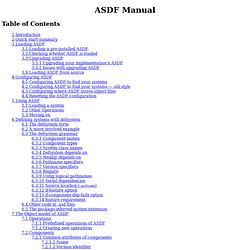
You can find the latest version of this manual at ASDF Copyright © 2001-2014 Daniel Barlow and contributors. This manual Copyright © 2001-2014 Daniel Barlow and contributors. This manual revised © 2009-2014 Robert P. Permission is hereby granted, free of charge, to any person obtaining a copy of this software and associated documentation files (the “Software”), to deal in the Software without restriction, including without limitation the rights to use, copy, modify, merge, publish, distribute, sublicense, and/or sell copies of the Software, and to permit persons to whom the Software is furnished to do so, subject to the following conditions: The above copyright notice and this permission notice shall be included in all copies or substantial portions of the Software. 1 Introduction 2 Quick start summary 3 Loading ASDF 3.1 Loading a pre-installed ASDF.
Beta. Quicklisp is a library manager for Common Lisp.
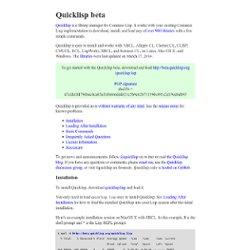
It works with your existing Common Lisp implementation to download, install, and load any of over 900 libraries with a few simple commands. Quicklisp is easy to install and works with ABCL, Allegro CL, Clozure CL, CLISP, CMUCL, ECL, LispWorks, SBCL, and Scieneer CL, on Linux, Mac OS X, and Windows. The libraries were last updated on March 17, 2014. To get started with the Quicklisp beta, download and load PGP signaturesha256 = 47cfdc0f4796b4c0ca05af16b666dd4b21c5b9e62b731390c895c2d19ed6d095 Quicklisp is provided as-is without warranty of any kind. To get news and announcements, follow @quicklisp on twitter or read the Quicklisp blog. Installation To install Quicklisp, download quicklisp.lisp and load it. You only need to load once to install Quicklisp. Here's an example installation session on MacOS X with SBCL. Loading After Installation. CLISP - an ANSI Common Lisp Implementation. CMUCL Home Page.
CMUCL is a free implementation of the Common Lisp programming language which runs on most major Unix platforms.
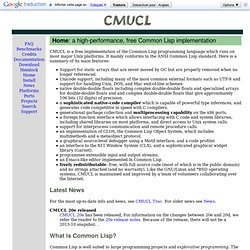
It mainly conforms to the ANSI Common Lisp standard. Here is a summary of its main features: Support for static arrays that are never moved by GC but are properly removed when no longer referenced. About - Steel Bank Common Lisp. Lisp Development. ECL - a Common-Lisp implementation. Armed Bear Common Lisp (ABCL) - Common Lisp on the JVM. Common Lisp implementation. Common Lisp implementations and their *features*.
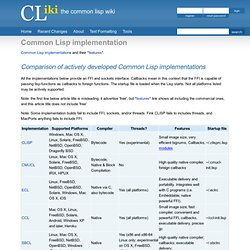
All the implementations below provide an FFI and sockets interface. Callbacks mean in this context that the FFI is capable of passing lisp-functions as callbacks to foreign functions. The startup file is loaded when the Lisp starts. Not all platforms listed may be actively supported. Note: the first line below article title is misleading, it advertise 'free', but *features* link shows all including the commercial ones, and this article title does not include 'free' Note: Some implementation builds fail to include FFI, sockets, and/or threads. Daniel Weinreb has a current (as of February 2010) survey of Common Lisp implementations that is more detailed than the chart above. All Free Software Common Lisp implementations (some of these may not be actively developed): For non-free implementations, see the list on wikipedia.
If performance is an important criterion for you, you might be interested in the Performance Benchmarks page. Common Lisp/First steps/Experienced tutorial - Wikibooks, open books for an open world. Basic Operations[edit] This chapter gives some theoretical basics about structure of Lisp programs.
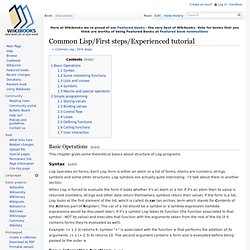
Syntax[edit] Why Do Those Wierd Lisp Programmers Always Talk About How Awesome Lisp Is? Download - Steel Bank Common Lisp. Clisp. Description Invokes the Common Lisp interpreter and compiler.
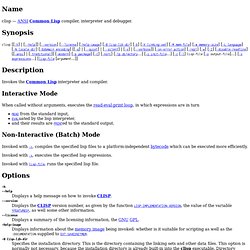
Interactive Mode When called without arguments, executes the read-eval-print loop, in which expressions are in turn READ from the standard input,EVALuated by the lisp interpreter,and their results are PRINTed to the standard output. Non-Interactive (Batch) Mode Invoked with -c, compiles the specified lisp files to a platform-independent bytecode which can be executed more efficiently. Common Lisp HyperSpec (TM) CLISP - an ANSI Common Lisp Implementation. Common Lisp Object System. Features[edit] The basic building blocks of CLOS are classes, instances of classes, generic functions and their methods.
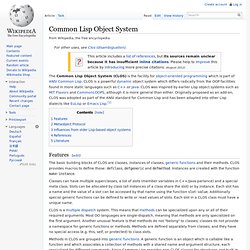
CLOS provides macros to define those: defclass, defgeneric and defmethod. Instances are created with the function make-instance. Classes can have multiple superclasses, a list of slots (member variables in C++/Java parlance) and a special meta class. Slots can be allocated by class (all instances of a class share the slot) or by instance. Methods in CLOS are grouped into generic functions. Dispatch in CLOS is also different from most OO languages: Given a list of arguments, a list of applicable methods is determined.This list is sorted according to the specificity of their parameter specializers.Selected methods from this list are then combined into an effective method using the method combination used by the generic function.The effective method is then called with the original arguments.
This dispatch mechanism works at runtime. For example, [edit] References[edit]